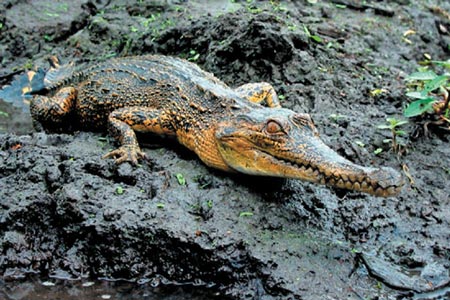African Crocodile Diversity Just Gets More and More Complicated
It seems that today’s extant reptiles have still got a lot to teach us about their phylogeny and taxonomic relationships as a team of scientists studying crocodiles in central Africa have discovered a new species of these ancient creatures. According to a scientific paper published in the academic journal “The Proceedings of the Royal Society B (Biology)”, the rare Slender-snouted crocodile (Mescistops cataphractus) is actually two species and these two species diverged from each other at least seven million years ago.
Slender-nosed Crocodile
An analysis of molecular data and genetic samples provided the University of Florida team, who working in collaboration with scientists from Gabon, with the evidence to suggest that there are two distinct species present in the central African crocodile population.
A New Species of Slender-nosed Crocodile May Have Been Identified
Picture credit: Matt Shirley
Describing how the discovery was made, lead author of the paper Matthew Shirley stated:
“It was simply a matter of going to places people before us never wanted to go or thought possible to go.”
African Crocodiles
This part of Africa had been beset with civil war, local militias and lack of infrastructure, the sites where Slender-nosed crocodiles could still be found were remote and very difficult to get access to.
Post doctorate researcher Shirley and his team have not only identified two genetically different species, but they have noted anatomical and physical differences too.
The researcher explained:
“There were actually two different species of Slender-snouted crocodile, as well as one sub-species, described in the past. Over the years these were all synonymised with Mecistops cataphractus, but we are now faced with the necessity of determining if any of these previous names is equally applicable to the new taxa.”
When it comes to the scientific names of organisms, any binomial name attributed in the past may take precedence, it will be a question of trawling through the archives to see if such a name exists. This new discovery has very important implications for the conservation of these small, Africa crocodiles. The split between the two species suggests that the West African Slender-nosed crocodile is on the verge of extinction.
Matthew Shirley commented on how vulnerable to extinction these crocodiles are:
“Over the past eight years of effort I and others have detected less than fifty Slender-snouted crocodiles in the wild in West Africa, and of these less than seven were adults, compared to nearly 2,000 in Central Africa over the same time period and survey effort. We recently evaluated its status for the 2014 IUCN [International Union for the Conservation of Nature] Red List and found that it is Critically Endangered making it one of the top crocodilian conservation priorities globally along with the decline of Gharials, Siamese and Orinoco crocodiles.”
Critically Endangered Crocodiles
The research team called for drastic measures to help these critically endangered crocodiles. It has been suggested that captive breeding programmes should be introduced with what crocodiles left in the wild being captured and put into zoos to permit the population to be boosted before any animals bred in captivity are released back into the wild.
Recently, crocodiles native to the African continent have gone through a considerable taxonomic revision. Up until recently only three species of crocodilian were recognised in Africa, the very dangerous Nile crocodile (Crocodylus niloticus), the Slender-snouted nosed crocodile (Mescistops cataphractus) and the Dwarf crocodile, also often referred to as Broad-snouted crocodile (Osteolaemus tetraspis). Studies (also involving staff from Florida University), have suggested that there are two distinct Nile crocodile species, and three, genetically different types of Dwarf crocodile.
If the scientific community recognises all of these new species then the species count for Africa will jump from three to seven. These changes will mean a re-evaluation of total crocodile numbers in the wild and will have implications for future crocodilian conservation.
The scientific paper: “Rigorous approaches to species delimitation have significant implications for African crocodilian systematics and conservation” by Matthew H. Shirley, Kent A. Vliet, Amanda N. Carr and James D. Austin published in the Proceedings of the Royal Society B.



That is so awsome. I hope these creatures keep living